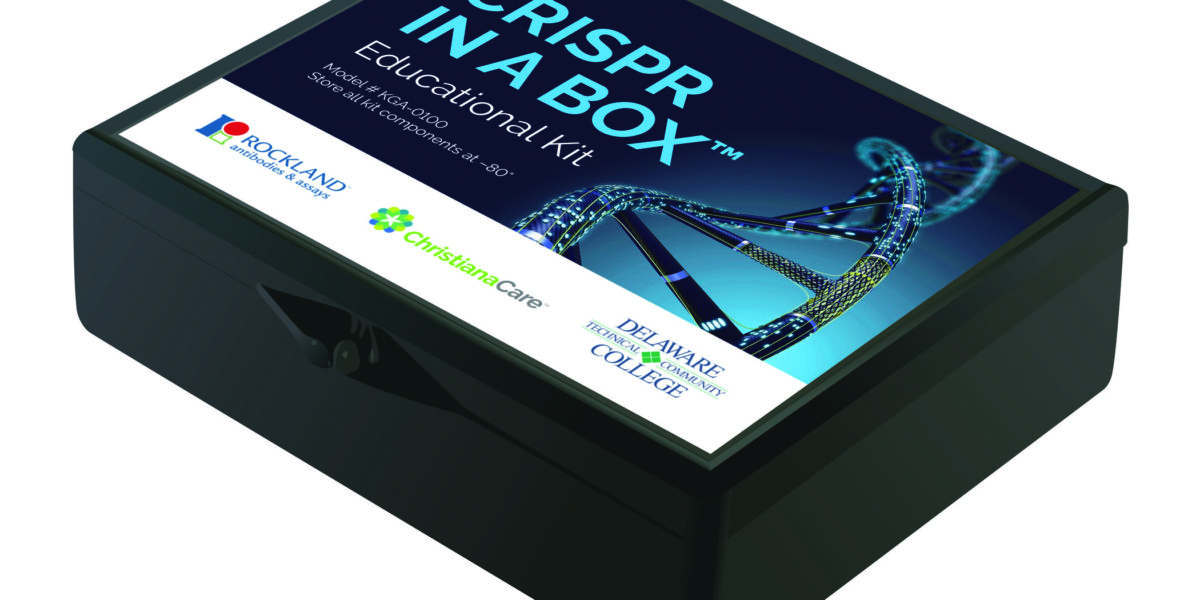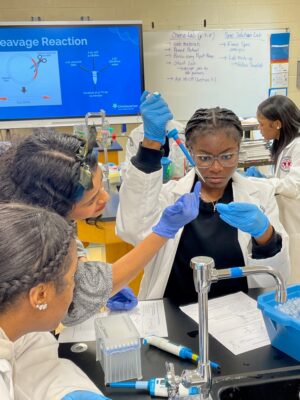Introducing CRISPR in a Box™ – it’s not a new crunchy cereal or the latest snack – it’s an educational tool kit consisting of state-of-the-science gene editing technology that could be coming to a school near you.
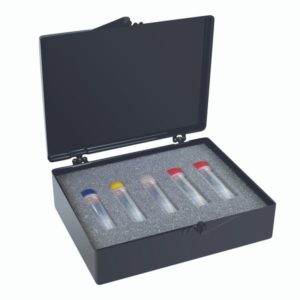
In a groundbreaking partnership, ChristianaCare’s Gene Editing Institute, Delaware Technical Community College and Rockland Immunochemicals, Inc. will market and sell CRISPR in a Box globally.
CRISPR in a Box is designed for use in educational sessions in high schools, community colleges, universities and companies and is also suitable for remote learning.
The partnership is likely the first-ever collaboration among scientists, educators and a life-science company to train the next generation of genetic scientists and technicians in the revolutionary CRISPR gene-editing technology.
The Gene Editing Institute and Delaware Tech also recently received a new $700,000 grant from the National Science Foundation—which backed the early development of CRISPR in a Box—to update the kit with an instructional exercise demonstrating how CRISPR can be used to detect and treat viral infections.
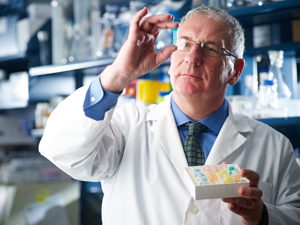
“This unique collaboration to educate students and instructors in CRISPR gene editing techniques will support the increased implementation of gene editing in educational programs, bioscience companies and research laboratories throughout the nation,” said V. Celeste Carter, Ph.D., lead program director, ATE Program Division of Undergraduate Education at the National Science Foundation. “The gene editing focus of the project ensures that technicians are graduating with critical entry-level skills, employability skills and skills supporting emerging technology areas in the biosciences.”
“With the CRISPR technology we have today, we are at the forefront of medical discoveries like no other time in history,” said Eric Kmiec, Ph.D, director of ChristianaCare’s Gene Editing Institute. “This partnership will fulfill our promise to deliver an educational module in gene editing to students that will cultivate a workforce with the special skills that are vital to unlocking innovative medical treatments to reduce suffering and improve lives today.”
The gene editing tools in CRISPR in a Box are designed based on the pioneering discoveries of the Gene Editing Institute that are currently being used to explore next-generation medical therapies and diagnostics for diseases including cancer, sickle-cell anemia and COVID-19. These tools include the CRISPR/Cas complex, a target DNA molecule, mammalian cell free extract and a synthetic DNA molecule.
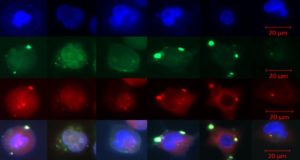
All materials in the existing kit and to be included in the updated version—the one that will include a focus on CRISPR applications for viral infections—are safe, synthetic materials. There are no live cultures or viruses involved. The kit is meant to provide a hands-on demonstration of CRISPR’s capabilities, and not allow for manipulations of living organisms.
CRISPR in a Box is the evolution of a partnership between the Gene Editing Institute and Delaware Tech that began in 2017 with an NSF grant to develop the first-ever gene editing curriculum for community college students. Under the original NSF grant, Delaware Tech used the kits in educational workshops that have trained more than 70 faculty members from community colleges across the U.S.
Delaware Tech will beta-test the new kits in its own gene editing courses and design an easy-to-use gene-editing guide and curriculum. Rockland Immunochemicals will assemble, package and sell the kits globally to academic institutions and life-science companies.
“Combining the unique talents of ChristianaCare’s world-renowned gene editing team, the teaching expertise of our instructors at Delaware Tech, and a robust educational kit combined with an easy-to-use gene editing curriculum we’ve developed will boost biomedical research and enhance the workforce in Delaware and beyond,” said Delaware Tech President Mark T. Brainard, J.D.
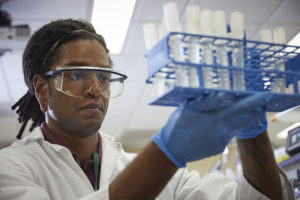
“We are thrilled to be involved in helping to train the next generation of scientists and to make a kit that is accessible to many educational institutions,” said Jim Fendrick, president and CEO of Rockland. “This collaboration is an excellent example of how strong the tri-state area has become in developing and commercializing cutting-edge life science research tools that can have a global impact. Rockland’s investments and capabilities in the areas of cell culture, molecular biology and immunology are beautifully highlighted through this partnership.”
CRISPR in a Box makes gene editing highly accessible for students who are interested in entering this growing industry.
“The kit is very easy to use,” said John McDowell, Ph.D., instructor at Delaware Technical Community College. “At Delaware Tech, we have had both undergraduate students and faculty from colleges from around the country reliably and successfully complete the laboratory activity,” he said.
“In the roughly two years of using the kit, there have been modifications and updates that have kept pace with the advances in the field,” Dr. McDowell said.
Another major advantage of the kit is its flexibility to implement in a curriculum.
“Since the foundations touch upon key themes in biology, it can be easily incorporated into practically any introductory or advanced biology course with a laboratory component,” Dr. McDowell said. “There is no requirement for specialized equipment. If a teaching lab can support bacterial cultivation, it can perform the in vitro gene editing lab activity.”
CRISPR in a Box™ educational kits can be ordered from the Rockland website.
